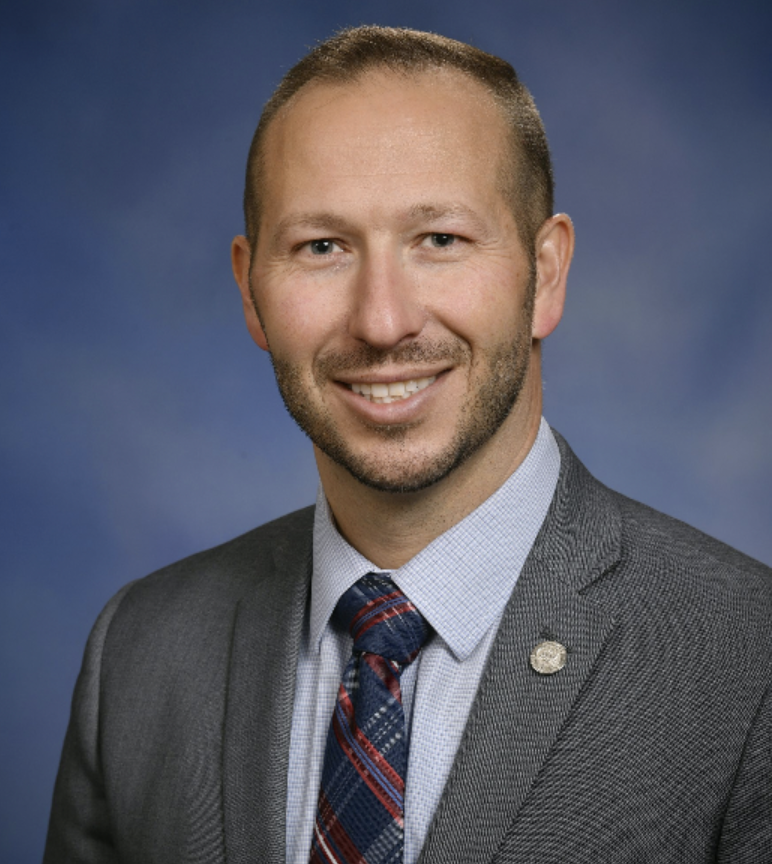
Michigan House of Representatives
Rep. Matthew Bierlein R-Vassar.By SOPHIA CERU
Capital News Service
LANSING – Recent legislative proposals would further restrict the distribution of deepfakes, the controversial images created by artificial intelligence, or AI.
Deepfakes are AI-generated videos of a person’s face on someone else’s body, usually shown engaging in sexually explicit activity and posted with malicious intent.
“With the technology and how easy it is to get your hands on and manipulate, it is reasonable to think that people don’t automatically know that what they are seeing is fake,” said Rep. Matthew Bierlein, R-Vassar, a sponsor of one of the bills.
The bills include penalties for the dissemination of intimate deepfakes, according to Bierlein.
The proposal for restrictions on AI arose after an incident involving music superstar Taylor Swift earlier this year.
Swift’s deepfake videos trended on the social media platform X and were seen by millions of people. The posts included AI-generated videos of her engaging in sexual content.
Bierlein said, “The timing (for the legislation) seemed right where there was a lot of attention to it, and we could get it to move forward.”
“It gives it a popular and relatable occurrence that multiple people have heard about, know about and actually have some sympathy for.”
Bierlein said he wants to ensure that people are protected and their reputations are valued.
“It is reasonable to say that you can’t make fake images of somebody and pretend it’s them and disseminate them for your profit or gain,” Bierlein said.
“It is too easy for someone who is maybe in a relationship that was going well and it goes bad and – with technology – you can make things happen that never really happened and send it out to all of your friends or a news source.”
“You put it online and it’s there forever,” he said.
He said the legislation, which is pending in the House Committee on Criminal Justice, “is probably just the tip of the iceberg. As this technology continues to advance, there is going to be a lot more policy discussion as to what is okay and not okay, what is fair within artistic purview versus you actually sending out false information about a person.”
Co-sponsors include Reps. Veronica Paiz D-Harper Woods, Stephanie Young D-Detroit, Mike McFall D-Hazel Park, and Natalie Price D-Berkley.
Criminalizing deepfakes raises the question of whether that approach conflicts with the First Amendment’s guarantee of free speech, according to a study from Case Western Reserve University.
Professor Michael McDaniel, the director of the Homeland & National Security Law programs at Western Michigan University’s Cooley’s Law School, said, “If you are superimposing someone’s face onto someone else’s body who is engaged in pornographic activity, I think that a reasonable person will find that’s highly offensive.”
In January, Georgia lawmakers proposed legislation to create a felony charge for creating deepfake video, audio or images that are distributed with the intent to influence an election.
The Georgia American Civil Liberties Union testified at a legislative hearing about its concern that the bill would set a precedent that will limit publication of online content.
Asked if the Michigan legislation potentially infringes on the First Amendment, McDaniel said, “It is probably going to be considered speech but lower-value speech, which means the courts are not going to give it the full protections.”
He said, “You have to have some level of intent on the part of the actor. It has to be reckless and/or intentional.”
“The other area where the idea of deepfakes applies is obviously if someone under the age of 18 is involved,” McDaniel said. “Any depiction of a child engaged in a sexual activity is going to be unprotected speech.”
Among the considerations are the distribution of sexually explicit photos and videos with the intent to coerce, threaten or intimidate and whether people depicted in deepfakes or revenge porn had distributed the photo on their own accord when it was taken and before it was applied to someone else’s body.